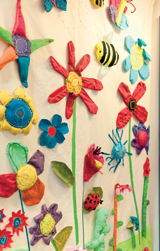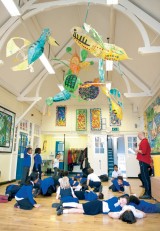Holy Trinity and Saint Silas is a primary overachieving in the face of adversity, as Jacob Stow explains...
Holy Trinity and Saint Silas is a school guaranteed to surprise unsuspecting observers. Even a cursory glance at its vital statistics throws up an intriguing anomaly. This Church of England primary, situated in the London Boroughof Camden, is smaller than the national average. Two-thirds of its intake hail from ethnic minority backgrounds, with almost half having English as an additional language. The proportion of its students considered to have learning difficulties is higher than the norm, as is the number of those claiming free school meals. Children entering its Reception class do so with levels of attainment far below what is expected of their age group. But whilst you might expect the combination of these factors to be reflected in its results – a simple matter of cause and effect – staff and children at Holy Trinity and Saint Silas would seem to delight in confounding expectations.
 Far from struggling under the pressures placed upon it, the school is thriving. Its most recent Ofsted report speaks of the excellent progress children make in every aspect of the curriculum, of the incredible strides taken in their very first year, and of the consistently lofty heights they have scaled by the time they make the step up to secondary education. It makes mention of Shakespeare, foreign language learning and exemplary behaviour – it has very little to say on the subject of improvement.
Far from struggling under the pressures placed upon it, the school is thriving. Its most recent Ofsted report speaks of the excellent progress children make in every aspect of the curriculum, of the incredible strides taken in their very first year, and of the consistently lofty heights they have scaled by the time they make the step up to secondary education. It makes mention of Shakespeare, foreign language learning and exemplary behaviour – it has very little to say on the subject of improvement.
Presiding over Holy Trinity and Saint Silas’s success is headteacher, Annie Williams, who arrived at the school in 2001 with an approach as ambitious as it has proven to be effective. “I made a promise to the parents when I arrived,” she reveals, “that their children would have the best education. I’ve always believed that teachers shouldn’t make excuses because children come from an area of high deprivation: ‘Oh, we can’t do this because these children come from an impoverished literacy background, their parents can’t read…’. I can’t bear that attitude. These are the children that need the absolute best education.”
Whether the parents believed her promise back then is debatable, but what isn’t is that she has made good on it. Speaking to Annie about the ways in which she has negated the disadvantages many of her students face, what emerges is a sense of her uncompromising pursuit of the highest standards, an unflinching belief in a philosophy centred on creative, arts-based learning, and a commitment to offering children all the opportunities a deprived upbringing may have denied them. At no point is the former clearer than when she speaks about the staff team she has assembled. “Offering the best teaching means having the best teachers, so recruitment has always been of great importance to me,” she explains. “My teachers must have travelled, they must have worked abroad – in Africa or India, for example. And they must have a fantastic degree from a very good university. Because we’re in central London, I expect them to go to all of the galleries and museums too. The more experiences they have inside them to draw upon, the more they have to share with the children.”
 This policy has resulted in a team boasting a conspicuous number of MAs and MSCs, real-world experience of professions as diverse as law and corporate management, and an impressive cache of air miles in the staffroom – though Annie is clear on the point that it is her teachers’ motivation to help children learn and achieve their best that is the most crucial qualification of all. But if who is teaching Holy Trinity’s children is telling, so too is how many. It is fair to say that there is an abundance of teaching staff, both full time and peripatetic, at the school, indicative of Annie’s desire to impart a breadth of subject knowledge to children that would be impossible for class teachers alone – as well as to offer the additional subjects such as French and Latin. “We do an enormous amount of team teaching,” Annie confirms. “We buy in a lot of specialists to work alongside our teachers for one or two days a week, to ensure that we’re offering a really exciting curriculum all of the time. If you have a teacher who is a brilliant mathematician, but who is not so confident in art, they need support; if I’ve got an NQT, I’ll always have English or Maths specialists in to work alongside them.
This policy has resulted in a team boasting a conspicuous number of MAs and MSCs, real-world experience of professions as diverse as law and corporate management, and an impressive cache of air miles in the staffroom – though Annie is clear on the point that it is her teachers’ motivation to help children learn and achieve their best that is the most crucial qualification of all. But if who is teaching Holy Trinity’s children is telling, so too is how many. It is fair to say that there is an abundance of teaching staff, both full time and peripatetic, at the school, indicative of Annie’s desire to impart a breadth of subject knowledge to children that would be impossible for class teachers alone – as well as to offer the additional subjects such as French and Latin. “We do an enormous amount of team teaching,” Annie confirms. “We buy in a lot of specialists to work alongside our teachers for one or two days a week, to ensure that we’re offering a really exciting curriculum all of the time. If you have a teacher who is a brilliant mathematician, but who is not so confident in art, they need support; if I’ve got an NQT, I’ll always have English or Maths specialists in to work alongside them.
The strong emphasis on creativity at Holy Trinity and Saint Silas is hinted at by the vibrant displays adorning the walls, the piano you pass on your way to reception and – at least during Teach Primary’s visit – the sounds of excited children reverberating around the building. It is also embedded both in the content of the school’s curriculum and the way in which staff go about delivering it. Five years ago the school, in partnership with a primary in Kentish Town, adopted the International Primary Curriculum, and it has proved a successful relationship – the IPC’s focus on internationalism and creative learning a logical fit with Holy Trinity’s well-travelled staff and arts focus.
“It was a significant investment, which is why we opted to do it in partnership,” Annie reflects when asked about her decision to make the change, “but it has worked very well for us, and the children love it. I think people were very bored with the old QCA; I was bored of seeing the same thing coming round again and again. We’ve retained elements of the old curriculum, of course – what we thought was of value – and tied them in to the new, but some of the IPC standalone topics, especially those focusing on science, are fantastic in their own right. ‘Our Place in Space’ is one of our most popular. We do it as a huge drama, with the children having to go for an interview to see if they’ll be astronauts, and those who are successful then going into space. When our Ofsted inspector observed one of these lessons, she turned to me and said, ‘I’ve got to leave, I’m going to cry – this is the most amazing thing I’ve ever seen,’ because the kids were so in role. The writing that comes out of that topic is unbelievable, because the children feel like they have been there; they are going into space, or have lost touch with the people that are.”
 To say that Holy Trinity has a flair for the dramatic would be something of an understatement. While children are frequently invited to tread the hall’s boards as part of their learning, staff across the year groups also employ teaching in role techniques to enthuse and engage their charges. “To me, drama is the most important vehicle there is for delivering an inspired and exciting curriculum,” Annie explains. “You can do anything and learn anything with it, you can explore all kinds of issues and tackle difficult topics which with children are difficult to hit head on.
To say that Holy Trinity has a flair for the dramatic would be something of an understatement. While children are frequently invited to tread the hall’s boards as part of their learning, staff across the year groups also employ teaching in role techniques to enthuse and engage their charges. “To me, drama is the most important vehicle there is for delivering an inspired and exciting curriculum,” Annie explains. “You can do anything and learn anything with it, you can explore all kinds of issues and tackle difficult topics which with children are difficult to hit head on.
“Teaching in role is an approach we introduce as soon as children arrive,” she continues. “The thing with drama is that you have to have absolute control; the children need to know what’s in role and what’s not. But it’s something they pick up very quickly and respond to. For teachers, it can be terrifying in the beginning – but they get to see it in action first, then have someone working with them. Because we have a drama specialist on the staff, there is a lot of training available – and when we have two teachers in role together, we have such fun; the class love it, and they get to see a close relationship between adults, which they may not necessarily see at home.”
Encouraging children to look beyond the hand life has dealt them, to aspire to achieve the very best that they can, is at the heart of Holy Trinity’s approach, and Annie clearly views her and staff’s focus on the arts as vital. She is also forthright in herassessment of what she sees as the failings in the wider education system and the impact they can have both on children and teachers, with the National Literacy Strategy – “At best, it stultified good teachers, and hopeless teachers couldn’t understand it anyway” – and Y1 phonics testing – “It won’t promote or foster a love of reading” – in particular coming in for criticism.
 “The arts are so important,” she explains when pressed further. “We’re culturally impoverished in schools these days, with everybody doing this testing nonsense. Schools need to enrich their students. Our children’s time here is about being successful, about achievement, about going on to the next stage of their lives with some music, some Shakespeare, some poetry – things that are going to enrich their souls, that will benefit their lives long-term. A lot of our children aren’t exposed to the opera, the ballet, the theatre, to art galleries, so it’s up to us to make these things available. I took the whole of Y6 to Oxford University, to Corpus Christi, to show them what they could aim for. I think it’s important to do it at this age, before they become disaffected or disillusioned.”
“The arts are so important,” she explains when pressed further. “We’re culturally impoverished in schools these days, with everybody doing this testing nonsense. Schools need to enrich their students. Our children’s time here is about being successful, about achievement, about going on to the next stage of their lives with some music, some Shakespeare, some poetry – things that are going to enrich their souls, that will benefit their lives long-term. A lot of our children aren’t exposed to the opera, the ballet, the theatre, to art galleries, so it’s up to us to make these things available. I took the whole of Y6 to Oxford University, to Corpus Christi, to show them what they could aim for. I think it’s important to do it at this age, before they become disaffected or disillusioned.”
Asked about what the future holds, Annie reveals her intention had been to move on from Holy Trinity and Saint Silas after five years, in search of new challenges. Now 10 years into the job, however, she feels there is still more that she can do where she is: “Once you develop the community, once you have parents who you really like and children who you love, you’re never quite finished,” she explains. “With this job you’re never satisfied. It’s like being an actor – you can always improve our performance; we all can, children, teachers, teaching assistants and heads.”
It is a simile that seems particularly apt in the case of Holy Trinity and Saint Silas – and the fact that, even after the Oscar-winning performances its teaching staff have turned in, the head still believes there is room for improvement perhaps tells you all you need to know about what they’re doing right.
 Sarah Hunter, IPC leader at Holy Trinity and Saint Silas, is quick to praise the opportunities the curriculum provides both her and children at the school: “What’s great about the IPC, she explains, “is that because it is linked to the National Curriculum you have the coverage you need, but it also gives topics a completely different dimension. You can teach it creatively, and as every topic has an internationalism sub-topic it’s easy to open children’s eyes to the wider world.
Sarah Hunter, IPC leader at Holy Trinity and Saint Silas, is quick to praise the opportunities the curriculum provides both her and children at the school: “What’s great about the IPC, she explains, “is that because it is linked to the National Curriculum you have the coverage you need, but it also gives topics a completely different dimension. You can teach it creatively, and as every topic has an internationalism sub-topic it’s easy to open children’s eyes to the wider world.
“I’ve just taught the Active planet, which looks at earthquakes,” she continues. “We focused on events in Haiti and I arranged an ‘earthquake’ in the classroom to show the children what had happened there, albeit on a far larger scale.It was a very easy, very visual way of saying ‘You’ve made the classroom look great again in 20 minutes; in Haiti, it’s two years later and they still haven’t sorted it out.’ That really affected them.”
One of the most striking examples of Annie’s efforts to broaden her students’ horizons is her introduction of Shakespeare to Holy Trinity’s curriculum. Her whole-school approach sees children exploring passages of text even in Y1 as part of a yearly ‘Shakespeare term’. “The infant classes each take a piece of the story,” she explains. “So, when we did The Tempest, one class took the storm – they looked at a couple of lines from the text, and then wrote their own music, and worked on a dance to represent the storm. The next class will do the same thing but with the next bit of the play. Y3 and 4 then look at a larger chunk of the text, while Y5 and 6 take on the entire play.
“During that term, all of their work spins off of the Shakespeare: the D&T, the English, the poetry, the art – even the science, depending on the play. It’s fantastic.”
 While many schools will settle for the dulcet tones of the recorder when it comes to encouraging their children’s musical talent, staff at Holy Trinity have thrown open the doors to the music cupboard and invited their budding maestros to take their pick.
While many schools will settle for the dulcet tones of the recorder when it comes to encouraging their children’s musical talent, staff at Holy Trinity have thrown open the doors to the music cupboard and invited their budding maestros to take their pick.
“Our Y4, 5 and 6 children – all 90 of them – play weekly, and all have an instrument they can take home,” Annie confirms. “Children in Y3 have access to lessons in school too, and we’ve even got some violinists in Y1. We have children playing the flute, sax, clarinet, trombone, trumpet and piano – they take their grades and they do extremely well.”
The focus on music extends to class orchestras, each of which is allocated 50 minutes per week during school hours to hone their skills, and a requirement for staff to join in too – though most are happy to admit that their skills are soon eclipsed by the children…
There is a strong emphasis on inclusive practice at the school, as evidenced by their decision to embark on the Inclusion Mark. “Our provision map is absolutely massive,” Annie says, “everybody gets some kind of support – whether it’s gifted and talented at the high end, those who require help with speech and language development, or any child with any other additional needs.
“A lot of it is done through drama and physicality,” she adds, “so we do a lot of interactive storytelling with groups of children. But we also do lots of one-to-one tuition and catch-up programmes of our own; we also have hand-picked reading and writing groups, a lot of fun work with phonics, as well as word recognition because not everybody learns that way.”
Supporting parents with maths
Ace-Maths
